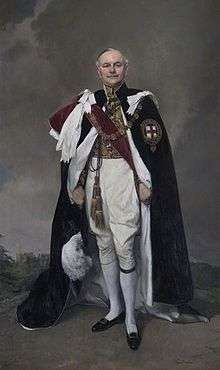Roger Lumley, 11th Earl of Scarbrough
Lawrence Roger Lumley, 11th Earl of Scarbrough, KG GCSI GCIE GCVO TD GCC PC DL (27 July 1896 – 29 June 1969) was a British Conservative statesman and British Army general.
Background
Lumley was the son of Brigadier General Osbert Lumley, youngest child and son of the 9th Earl. He attended Eton College and Magdalen College, Oxford.
Career
Lumley followed his father into the military, passing out from the Royal Military College, Sandhurst. He was commissioned a second lieutenant in the 11th Hussars on 26 January 1916,[2] and was promoted to lieutenant on 26 July 1917.[3] He served in France during World War I. He was demobilised on 3 June 1919, with the rank of lieutenant,[4] but retained a reserve lieutenant's commission in the 11th Hussars, as well as being attached to the Yorkshire Dragoons.[5] From 1920 to 1921, he was attached to an Officer Training Corps (OTC) University Contingent, with the local rank of captain.[6]
Lumley sat in the House of Commons as Member of Parliament (MP) for Hull East 1922–29, then York 1931–37. In 1923 he was Parliamentary Private Secretary to William Ormsby-Gore, from 1924–26 to Sir Austen Chamberlain and subsequently to Anthony Eden. On 8 March 1931, he was promoted to captain in the reserves in both the 11th Hussars and the Yorkshire Dragoons.[7][8] He was brevetted to the rank of major in the Yorkshire Dragoons on 1 January 1937,[9] and was awarded the Efficiency Decoration on 11 May.[10] In 1937, he was appointed Governor of Bombay, serving until 1943. Upon his return from India, Lumley served as acting Major-General in World War II. Following the War, he continued his connections with the Army, as an honorary colonel. He succeeded to the Earldom of Scarbrough in 1945 following the death of his uncle. He served as Lord Chamberlain from 1952 to 1963 and chancellor of the University of Durham from 1958 to 1969. He was made a Knight of the Garter in 1948.
Outside politics, the Earl had a keen interest in Asian and African studies. He presided over the Interdepartmental Commission of Enquiry on Oriental, Slavonic, East European and African Studies set up after the Second World War to consider how Britain might maintain and increase the links it had built up during the war in the geographical areas under the Commission's consideration. The Commission's report, presented in 1947, argued for considerable strengthening of university departments' capacity to carry out research and training related to these areas, and for significant funds to be made available to this end. However, after five years of strong growth following the presentation of the Scarbrough report, in 1952 much of the funding was withdrawn.[11]
Lumley was a freemason and, from 1951 to 1967 served as the Grand Master of the United Grand Lodge of England.
Family
Lumley married Katherine Isobel McEwen, sister of Sir John McEwen, 1st Baronet on 12 July 1922 at St Margaret's, Westminster. They had five children:
- Lady Mary Constance Lumley (20 Apr 1923 – 23 Jan 1998); married Lt Col Roger Fleetwood-Hesketh
- Lady Elizabeth Lumley (b. 22 Jul 1925); married Christopher Beckett, 4th Baron Grimthorpe, had 2 sons and 1 daughter. Their older son is Edward Beckett, 5th Baron Grimthorpe.
- Lady Anne Katharine Gabrielle Lumley (16 Nov 1928 – 2006); married Matthew White Ridley, 4th Viscount Ridley, had 4 children, one of whom is zoologist and writer Matt Ridley.
- Richard Aldred Lumley, 12th Earl of Scarbrough (5 Dec 1932 – 23 Mar 2004); married Lady Elizabeth Anne Ramsay (daughter of Simon Ramsay, 16th Earl of Dalhousie), had 4 children
- Lady Jane Lily Serena Lumley (5 Oct 1935 – 15 Mar 2016) ; married Hugh Wiley, had issue.
References
- ↑ "Colonial administrators and post-independence leaders in India (1616–2000)". Oxford Dictionary of National Biography (online ed.). Oxford University Press. (Subscription or UK public library membership required.)
- ↑ "No. 29450". The London Gazette. 25 January 1916. p. 1007.
- ↑ "No. 30537". The London Gazette (Supplement). 19 February 1918. p. 2314.
- ↑ "No. 31369". The London Gazette (Supplement). 30 May 1919. p. 6774.
- ↑ "No. 31369". The London Gazette (Supplement). 30 May 1919. p. 6777.
- ↑ "No. 31873". The London Gazette (Supplement). 20 April 1920. p. 4674.
- ↑ "No. 33712". The London Gazette. 1 May 1931. p. 2805.
- ↑ "No. 33782". The London Gazette. 22 December 1931. p. 8256.
- ↑ "No. 34356". The London Gazette. 1 January 1937. p. 15.
- ↑ "No. 34397". The London Gazette. 11 May 1937. p. 3113.
- ↑ Report of the Sub-Committee on Oriental, Slavonic, East European and African Studies (Hayter Report). London: Her Majesty's Stationery Office. 1961. pp. 6–40.
- ↑ Telegraph announcements
External links
- Hansard 1803–2005: contributions in Parliament by the Earl of Scarbrough
- "Obituary – Lawrence Roger Lumley". Bulletin of the School of Oriental and African Studies (courtesy of JSTOR).
- "Cidadãos Estrangeiros Agraciados com Ordens Portuguesas". Página Oficial das Ordens Honoríficas Portuguesas. Retrieved 3 August 2017.
